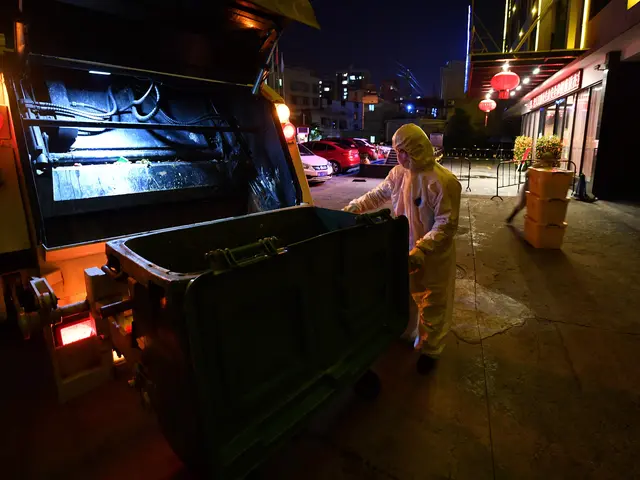Wearing a white protective suit, a red safety helmet, a face mask and goggles, Feng Tao, an inspector at the Urumqi Medical Waste Disposal Center in northwest China's Xinjiang Uygur Autonomous Region, was busy with his work.
Two incinerators with a height of more than 10 meters were in operation, burning various medical waste including those from the treatment of patients infected by the novel coronavirus.
Feng, 36, said he had been working day and night with 31 of his colleagues over the past two weeks due to the virus outbreak, because the potentially contagious medical waste needs to be disposed of as soon as possible.
They also resorted to some unconventional ways to grapple with difficulties arising from the epidemic, such as unexpected shortage of protective facilities.
"We try not to eat, drink and go to the bathroom during work," Feng said. "Because after that, you have to get disinfected again and change a new protective suit."
"During this tough time combating the spread of the virus, there are very limited protective suits but a huge amount of medical waste. We have to save supplies and time," said Feng.
The father of a five-year-old girl said he did not go home during the last two weeks as he was afraid of infecting his family.
"I miss my daughter," Feng said while holding back his tears. "But safety and work come first."
Liu Yunhe, 46, is a deliveryman in the disposal center. His job is to unload medical waste barrels from transfer vehicles and transport them to a temporary storage warehouse in the disposal center.
Liu used the best possible protective equipment in the center due to the dangerous nature of his job.
"I'm soaked every time I finish my shift," said Liu. "I try not to go to the toilet to save one more protective suit."
Located in the western suburb of Urumqi, the center's disposal volume of medical waste ranks first in Xinjiang, incinerating up to 9,000 tonnes of medical waste annually.
At the end of January, Xinjiang activated a first-level emergency response to contain the spread of the viral epidemic, which has so far caused dozens of infections in the region.
"We give priority to the medical waste and try to dispose of all such waste every day," said He Hailong, head of Xinjiang Huihehanyang Environmental Engineering Technology Company, the operator of the disposal center.
According to statistics from the ecological environment department of Xinjiang, there are 20 centralized medical waste disposal facilities in 14 cities and prefectures across the region, with a daily disposal volume of about 60 tonnes of medical waste.
Since Jan. 20, the total medical waste disposed of across the region has exceeded 1,100 tonnes.
"After the outbreak, hundreds of workers in the waste disposal sector have stuck to their jobs," said Yang Chun, an official with the region's ecological environment department.
"Although they don't work at the front line of the battle against the epidemic, they do their best to aid the epidemic prevention and control efforts," Yang added.
 简体中文
简体中文

